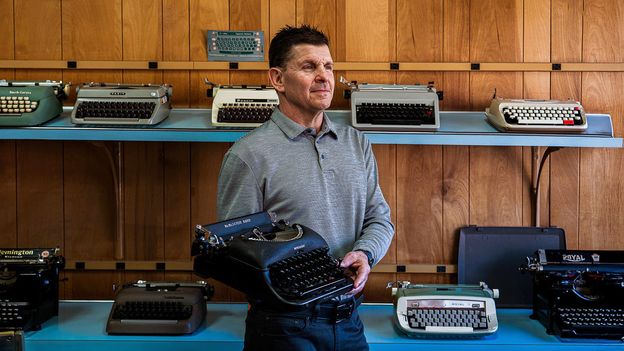Typewriters Still Find a Place in the Modern World
While contemporary writing predominantly occurs on computers and smartphones, typewriters remain relevant in the US, serving specific purposes that digital devices cannot replicate.
Every day, customers walk into Mike Marr’s shop in Pawtucket, Rhode Island, carrying old typewriters in various states of disrepair. Marr inspects each machine, often finding them covered in years of dirt and wear. Keys may be stiff, or paper might jam, leading customers to ask if they can be restored. With over 20 years of experience, Marr assures them he will do his best to revive these relics.
“The smiles on their faces when they pick up their typewriters is everything to us,” Marr states. Even in 2025, well over a century since the introduction of the first commercially successful typewriter in the US, demand for repairs remains significant, with Marr servicing 20 to 25 machines weekly and employing three additional staff members to keep pace.
Despite the dominance of internet-connected devices for most business functions, typewriters still find a home in small offices and warehouses. Many users, including businesses that rely on them for printing names on forms and addressing envelopes, have no plans to transition to computers for these tasks. Marr’s grandfather established Marr Office Equipment in 1953, and the store previously enjoyed a booming business as a typewriter distributor for IBM, delighting Marr’s father and uncle.
Notable businesses in the area continue to utilize typewriters daily. For instance, the law firm Tomasso & Tomasso relies on them for legal documents. Co-owner John Tomasso explains that they use typewriters every day, emphasizing that such devices remain the best option for their needs. Typewriter maintenance is minimal, with ink ribbons costing about $5 compared to significantly more expensive printer ink.
As more businesses adopt old-school methods, they appreciate the tactile experience and immediate satisfaction of using typewriters. Examples include real estate agency Jarvis Realty in Milwaukee, which uses typewriters to create contracts efficiently without wasting paper, and personal users like Anjali Banerjee, a novelist who finds typewriters help her concentrate better without the distractions of computers.
As long as there are writers and professionals who prefer the hands-on approach of typewriters, these machines will continue to serve a purpose. Mike Marr, firmly rooted in typewriter repair, emphasizes his commitment to keeping these vintage machines operational for their owners, ensuring that typewriters have plenty of work left in them, despite being overshadowed by modern technology.



